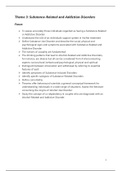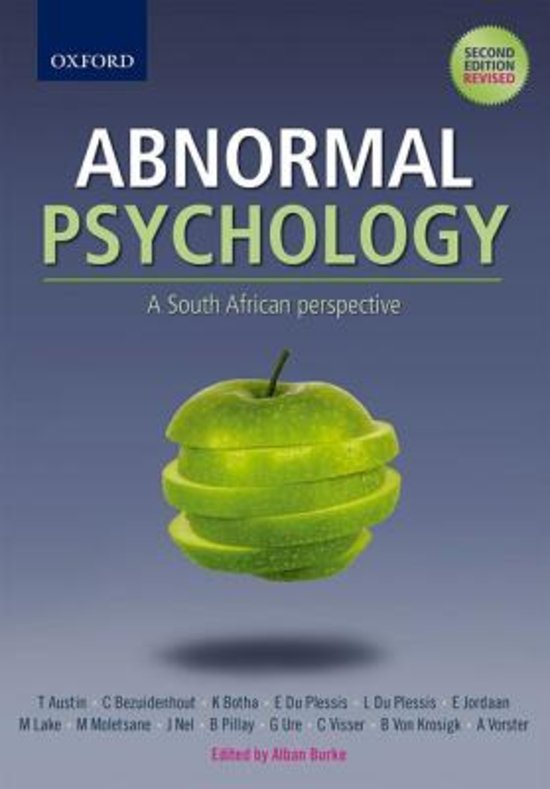Theme 3: Substance-Related and Addiction Disorders
Focus:
➢ To assess accurately those individuals regarded as having a Substance-Related
or Addictive Disorder
➢ Understand the role of an individuals support system in his/her treatment
➢ Define Substance Use Disorder and describe the social, physical and
psychological signs and symptoms associated with Substance-Related and
Addictive Disorder
➢ The notions of causality are fundamental
➢ The drinking patterns that lead to Alcohol-Related and Addictive Disorders,
for instance, are diverse but all can be considered from 4 interconnecting
aspects: sociocultural, behavioural/psychological, physical and spiritual
➢ Distinguish between intoxication and withdrawal by referring to essential
features of each
➢ Identify symptoms of Substance-Induced Disorders
➢ Identify specific subtypes of Substance-Related Disorders
➢ Define comorbidity
➢ Theories offer behavioural scientists a general conceptual framework for
understanding individuals in a wide range of situations. Assess the literature
concerning the origins of Alcohol Use Disorder
➢ Study the concept of co-dependency in couples who are diagnosed with an
Alcohol-Related and Addictive Disorder
1
, Introduction:
“substance” to refer to both licit (alcohol) and illicit (e.g. marijuana, cocaine, heroin) drugs except
when a distinction is important due to differing research findings.
There are 2 types of bias among practitioners in their approach to social problems
➢ Intrapersonal qualities
➢ Extraneous / situational factors
The ecological-interactionist perspective focuses directly & continuously on specific aspects of
the unique social setting & the individuals’ dynamic role within it.
The multidimensional nature of Alcohol-Related & other Addictive Disorders dictate …
➢ Biological dynamics – individuals’ peculiar style of cog. functioning
➢ Sociocultural aspects of individuals
… should be considered
Explore: the biological realm; psychological dimension; social dynamics
Substance abuse is often listed as a symptom under other disorders
Disorders of this nature: specific identifier is the compulsive failure to control/ extreme
difficulty in controlling, impulses, in spite of the neg. consequences attached to acting on
these impulses
Failure to control impulses, also refers to the impulse to engage in violent or destructive
behaviours
The definition of addiction …
Addiction is a primary, chronic disease of brain reward, motivation, memory, and related
circuitry. Dysfunction in these circuits leads to characteristic biological, psychological,
social, and spiritual manifestations. This is reflected in an individual pathologically
pursuing reward and/ or relief by substance use and other behaviours. Addiction is
characterised by inability to consistently abstain, impairment in behavioural control,
craving, diminished recognition of significant problems with one’s behaviours and
interpersonal relationships, and a dysfunctional emotional response. Addiction often
involves cycles of relapse and remission. Without treatment or engagement in recovery
activities, addiction is progressive and can result in disability or premature death.
2
, Theories of Addiction:
Moral Theory
Foundations in the social thinking that certain people either have deficits in their ability to take
personal responsibility for their lives or they lack spiritual strength to deal with events in
their lives.
A spiritual guide or religious teacher is required to assist the person back to the right moral
path.
The judicial system takes a similar position. Substance abuse is not a justifiable defence for a
crime and individuals are held accountable for their actions. Using substances – or not
attempting to get help in controlling an addiction – is regarded as ‘wilful misconduct’ and
requires law enforcement to punish offenders
E.g.: Driving under the influence is a crime
Correctional services intervention may be required to ensure that the person remains
accountable and to impose punitive consequences, if considered necessary.
Psychoanalytic Theories:
Individual character trait differences were grounded in psychoanalytic understandings of
people.
Psychoanalysis on addiction: result of a person’s developmental stasis at significant stage of
their personality development. In the case of addiction, this is at the oral phase.
This has been linked over time to sex-role conflicts, latent homosexuality and low self-esteem.
Stasis: a period or state of inactivity or equilibrium.
Contemporary Psychoanalytic Theory views addiction: result of an individual’s attempt to
reduce anxiety.
Abuse of substances are ways for the person to protect themselves against debilitating and
painful emotions (loneliness or depression). In this situation, intervention by a trained
professional is required.
3





